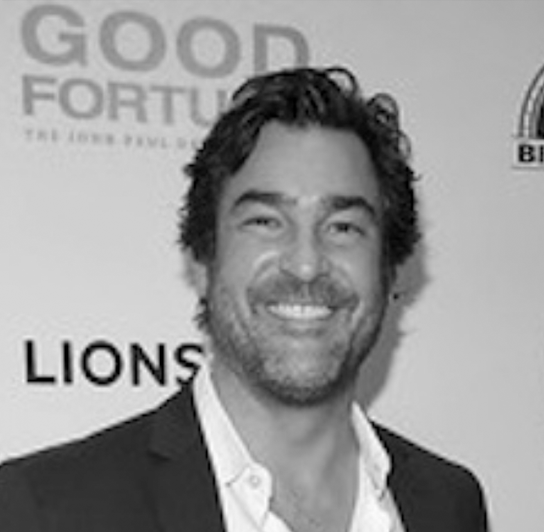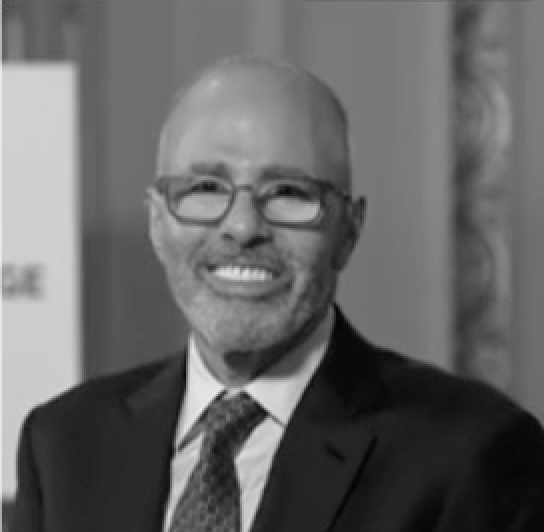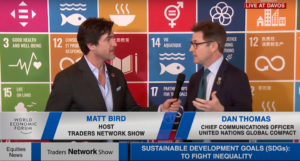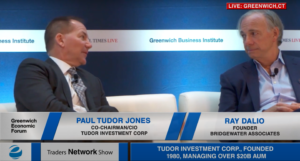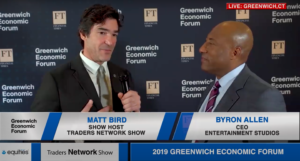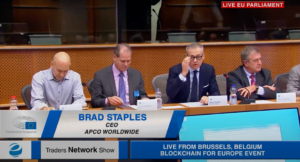Fr. David Nazar President of the Pontifical Oriental Institute Interview PT. 1 with Matt Bird at Humanity 2.0 | Traders Network Show – Vatican City Pt. 1
Contributed by: Show Editorial Team
Father David Nazar Rector at the Pontifical Oriental Institute interview with Matt Bird at Humanity 2.0 (Vatican City)
HIGHLIGHTS
- Exclusive one-on-one interview with Fr. David Nazar, Sj
- Growing up ethnic in Canada, helped shape Fr. David’s childhood
- The Pontifical oriental Institute is the only University in the world that studies the Eastern churches
FULL COVERAGE
INTERVIEW TRANSCRIPTS: Fr. David Nazar, Rector at the Pontifical Oriental Institute with Matt Bird
Matt Bird – Show Host, Traders Network Show: 00:00
Welcome back to the Traders Network Show and our continued coverage of Humanity 2.0. I’m Matt Bird broadcasting worldwide from Rome, Italy for Equities.com and our syndicated partners. Our next guest is Father David Nazar. David is the President of the Pontifical Oriental Institute. He is a Canadian Jesuit born of a family of Ukraine origin. David is also the former superior of Jesuits and Ukraine and former president of the Jesuits in the English Canada Providence. Did I get all that right? Well listen, David, welcome to the show. Thanks for coming down here. Now David, we had a chance to get together yesterday at the Humanity 2.0 event which was prolific to say the least. There was a tremendous amount of influencers and a lot of content and a lot of great ideas that were shared. And I really appreciate you taking the time to sit with me in your house. So, I had a chance to ask some people and I have asked a few people at what they, if they can describe you, how would you describe –
Fr. David Nazar, SJ – Rector, Pontifical Oriental Institute: 01:11
Well I’d have to call my mother to answer that question.
Matt Bird – Show Host, Traders Network Show: 01:14
And this is what they said. David, you are determined, serious, playful, mischievous, unstoppable, a force of nature and a visionary. Would you say that’s right?
Fr. David Nazar, SJ – Rector, Pontifical Oriental Institute: 01:33
Well, I can see where people would say that in certain aspects. I don’t think I’d use those. Again, I don’t think my mother would recognize her son after hearing those words, but I can see that cause we’re in the world that’s on the move and you’ve got to be on the move. So you’ve got to stay up with things. You’ve got to see how we integrate what’s going on in the world today, here in a teaching institution and the way we operate and our administrative structure. How are we understanding the world? So yeah, if you’re not moving, you’re dead.
Matt Bird – Show Host, Traders Network Show: 02:04
Right. Okay. And speaking of moving. So you know, what I like to do is give our audience a little bit of, of a looking into your life cause you’ve gone on an incredible journey. You’ve gone around the world, I think you were referred twice. But your journey in the path of where you got now and the influence you have and what you are doing in your term here. It’s taken second, you a lifelong taking a lifelong journey to get here. Tell us where, where did it all start?
Fr. David Nazar, SJ – Rector, Pontifical Oriental Institute: 02:32
Well, the one key thing is growing up, uh, ethnic in, uh, at that time it was quite a British dominated Canada. So I was born in 1952 and ethos in Toronto where I was born and raised was still very much a British. So we learned British history instead of Canadian history. British immigrants felt themselves at home. But, so many immigrants came to Canada after the second world war. Italians, Croatians, Polish, Ukrainians, and we belong to one of those sub-communities. And so my experience was always growing up in two cultures. And you have to know the language. By language I mean the subtext of each language and how to operate in two worlds. I remember a crazy experience, I think it was in the second grade and I still had Ukrainian words in my English vocabulary and I said something to one of the classmates and he didn’t understand and it was the first time I really realized I have two cultures going on to me and even to languages and some ways that became thematic foreign because it was a lot of the immigrants who built the country, even though that the history books at the time spoke about the original peoples, the French and the a and British.
Fr. David Nazar, SJ – Rector, Pontifical Oriental Institute: 03:34
I then worked with native people after I entered the judge butts. I work with native people and it was just easy for me to enter into their culture, a different world. It’s the same human experience, but you put the pieces together differently. The different points of interest, different points of emphasis for them. Community spirituality was so strong in the dominant society. It’s individualism, it’s getting ahead, it’s defining yourself and you realize that life is an awful lot bigger than my limited experience, you know? And that only continued, through life. So going to Ukraine or coming here to Rome, that adaptation piece for me was always very easy. So if you look for one kind of leap motif for one kind of thread through my life, it’s going into different cultures and finding out how they work and operated, which I think is significant for today when the whole world is going through so many changes. How do you find those threads that give sense to what you’re doing and still accept change and movement forward?
Matt Bird – Show Host, Traders Network Show: 04:34
Have you ever felt that there’s something driving you?
Fr. David Nazar, SJ – Rector, Pontifical Oriental Institute: 04:44
To be honest with you, I would have to refer to the faith aspect. We grew up in a very Catholic family, but I don’t want to overstate that. It was the time when everybody was going to church in the 50s then the 60s came and nobody was going to church. And I remember I was always good in school and I had no difficulty deciding on any kind of profession. But when I got to university at the University of Toronto, I realized something deep in me, didn’t know where I was going and I could do all the subject materials, but I didn’t know where I wanted to end up. So a friend of mine and we took second year off university and we traveled through Europe for a year.
Fr. David Nazar, SJ – Rector, Pontifical Oriental Institute: 05:20
And that was what gave me some freedom to say what is my life really about? And the God questions came back and I just had the sense that I better resolve this now rather than look back 10 years from now. And so the notion of being a priest, I entered the Jesuits and just a world opened up for me. So again, that’s been like a guiding thing for me. It’s also given me a lot of freedom. So, I’m not worried about if I’m going to live or die if I go to work in this place or that country or whatever situation. Cause you’ve got the sense that God is calling me there or God is walking with me or we’re going to figure this out together. But there’s sense of a real security, not that’s not to say there is no danger and no problems, but there’s a real sense of I can walk through this and we’ll figure it out.
Matt Bird – Show Host, Traders Network Show: 06:06
Did you think through the pet journey you’re going on and you’d end up here at the Vatican in Rome?
Fr. David Nazar, SJ – Rector, Pontifical Oriental Institute: 06:11
No, at a certain stage. I had a vague sense that I would wind up in another country only because the world was getting smaller and we’re kind of well-educated and well trained and I could speak a couple of languages and to be honest with you, when the first real intuition of that came when the unit, the Soviet Union collapsed because being of Ukrainian origin and there you have the Byzantine church and it’s not the Latin church. I spoke some Ukrainian, I expected a phone call saying a the churches is operative now in Ukraine and we want you to go back. We want you to go there because you know the culture, the language and nothing happened for 10 years. Then when it happened in 2002, I was asked to go and to be the superior of the Jesuits in Ukraine and start some projects and all. So yeah, the whole thing of again, adapting to cultures, you’re going into a new place, my background I feel prepared me very, very well for that, but I really don’t even know what’s going to happen two years from now. I could, I wind up in Africa or in New York working at the United nations. It just depends what emerges.
Matt Bird – Show Host, Traders Network Show: 07:19
Do you have a, you know, as have you gone through obviously many different cycles, um, to get to where you’re at today, um, career in a personal and interpersonal. Are there certain things you look back on now and go, those were really pivotal moments?
Fr. David Nazar, SJ – Rector, Pontifical Oriental Institute: 07:37
I would say that that’s really everything. You know, there’s a funny way in which you arrive someplace in your life and then you realize how important district that was in your past that you didn’t really, weren’t really taking account of when you were there. So like I can name some things. For example, when I worked with the Ojibwe Aboriginal people in on Manitoulin Island in Northern Ontario, they have such a deep sense of community and a deep sense that a certain spirit infests everything is in everything and you have to walk through life with great respect, always seeking reconciliation and forgiveness with other people. And even as I say those words, they sound like charming words but they’re not very strong in say dominant North American society. And you find that your heart is opening up or something in your very self is opening up by being with these people, by being in another culture.
Fr. David Nazar, SJ – Rector, Pontifical Oriental Institute: 08:29
All the administrative experience I found as provincial in Canada. Then you go to Ukraine and that’s another culture, a slightly different emphasis of things and what those people are doing are bringing out all sorts of things that are in myself that you kind of didn’t know were there the playfulness that you mentioned earlier, the not taking everything so seriously, you’re going to make a difference, but you’re not going to change the whole world by tonight, you know? So can you have patience, can you forgive yourself? Can you let go of your own presuppositions? And then coming here that there’s a funny way in which the community worked with native people, the administrative work that they did in Toronto, the other culture experience in Ukraine are all very precise preparations for being the president of this, the University. But I could never have planned that.
Matt Bird – Show Host, Traders Network Show: 09:19
So is there anything that you, if you look back and obviously you are running the university, it’s a graduate school. Actually, you want to tell us a little bit about it?
Fr. David Nazar, SJ – Rector, Pontifical Oriental Institute: 09:27
Sure. This is a graduate school. It’s highly specialized. It deals with what we call the Eastern churches. So the dominant Catholic church in the world that you see in most Western countries is the Latin right of the church. People just accept it as the Catholic church. But in fact, when you go to, everything from Russia down to Ethiopia, from Southern Italy, over to India, you have all these Orthodox and Catholic churches that come from the earliest periods of the church from gospel times. And they’ve articulated the same faith in a different way. So what this institution here focuses on is all of those other churches that aren’t though the Latin church. So there’s an extraordinary library. There’s students from all of those countries, quite a mixed of cultures, 40 different countries that are here. And it’s in many, these are the suffering countries. Now all the countries of the middle East, we have students here from Baghdad, from Syria, from Egypt, many students from Ukraine.
Matt Bird – Show Host, Traders Network Show: 10:15
And how did they, how do they, how do they find their way here?
Fr. David Nazar, SJ – Rector, Pontifical Oriental Institute: 10:28
They find the way here because there are a few universities, in fact, this is the only university in the world that studies all of the Eastern rights. So it studies the churches, but you can’t study your church without studying the context. So it studies the politics. It’s, that is the literature. We have an extraordinary collection here of, of Arabic literature for example, from the ninth 10th, 11th centuries when Baghdad was the Paris of its time. Just to give you a little anecdote, for example, so you had Jewish scholars, Christian scholars, and Muslim scholars. All working together. The Christians had translated Aristotle from Greek into Arabic and they find that Arabic is an extraordinary language for philosophy.
Fr. David Nazar, SJ – Rector, Pontifical Oriental Institute: 11:08
What they begin to talk about, what is the philosophy of the state that we should have? They agreed that it should not be religious, that the political leaders should be a different, different from the religious leader. I think that’s hard for us to imagine today when we hear of all of what’s going on in the middle East and the Califit and diaspora or ISIS, all these things. But those were real thoughts, real worked out thoughts and systems in the 10th century. So partly what students are doing here is going back to the manuscripts to figure out what they should be today but based on histories of their own culture.
Matt Bird – Show Host, Traders Network Show: 11:54
You know, I don’t want to get into the complexities of that stuff, but it does bring up a couple of questions of what’s happened? It seems like we’ve gone through transformation on some level agenda based transformation, whether it be commerce driven, whether it be power driven and maybe it’s a conversation for another time, but, what happened with the fundamental ideal of where all this started and where it’s at now?
Fr. David Nazar, SJ – Rector, Pontifical Oriental Institute: 12:12
Well, I think there’s more positive, in the very question that you’re asking than there is negative because the times of change upset people, but times of change are equally opportunities. And what are we seeing now that we didn’t see when, when all of us here were children. The world is not unified by a certain set of values. A nation is not unified by its own history and culture. Everything is intercultural. Everything is integral by travel, by internet, by information. We see a revolution happening on the streets of Turan while it’s happening, we’re getting Twitter information while the thing is going on and that affects mentalities. And so you see that very quickly. If I again speak of cultures that people have different ways of organizing their worlds and realities and we’re aware of what we grew up with is no longer satisfactory. So how are we creating, how are we moving towards new values? New integrations of a global society. So Brexit is its expression of the frustration. The American system right now is going through, uh, going through a crisis. France has its issues. Greece has its issues. Not to mention the middle East, Ukraine and Russia. The nation state is not what it was a hundred years ago. So how do we find our way as a global community in this new reality? It’s exciting and it’s nervous.
Matt Bird – Show Host, Traders Network Show: 13:41
You know, I think yesterday we touched on what’s going on in our schools and what should be happening at home and where we’re getting the fundamental moral or ethical directions. And I’m trying to figure out how to navigate these waters a little bit, but it seems there has been a little, there’s been less home integration and direction than there has been in the past with our children and teachers have been stepping up, you know, and not in necessarily a bad way, but try to fill that with their own, you know, where I’m going with all this.
Fr. David Nazar, SJ – Rector, Pontifical Oriental Institute: 14:20
Sure. Well, let me just jump in cause the cause the questions are our directions. For example, when I was a kid, you got beat at school and if your parents know that you got beat at school, your parents beat you again. Right? Or if you got a did something crazy on the street, even a neighbor could wack you in the head and then your parents whacked you again. Whereas, then when I was around the time of high school, if you, if your teacher there to hit you, your parents were there to beat up the teacher, so to speak figuratively and so many things like that have changed that there’s so many different kinds of values. The values that our parents had or the balance that I had 20 years ago or a little bit different than now. I remember about 30 years ago as sociologists were saying that a new generation rises every seven years.
Fr. David Nazar, SJ – Rector, Pontifical Oriental Institute: 15:07
Today a new generation rises every three or four years and we have names for the Millennials and Generation X and Generation Y and renaming these things every five and 10 years. That’s talking about a different set of values. Now I think one of the great things about the meeting yesterday is that people realized that to organize a social response or society, we have to go back to some kind of common set of values. So this, this kind of murky globalization period that we’ve been going through is now returning to what are we really about? What are the things that bind us together? Because we’ve got to be bound together. If we’re going to move things forward and the conversation is moving towards it in the United States, in England, in independent countries and that’s where it’s got to go.
Matt Bird – Show Host, Traders Network Show: 15:51
You know, I think the glue that’s, that’s it’s pulling that or making that, um, uh, kind of a solid thought process right now is that I think when you start seeing social media is kind of a false friend, um, you know, the thing that’s actually creating all this information validating some thought leadership is not really solid and not really there for you. And so when in times of need or help, you know, the people that would support an idea or you know, a thought, just the fundamentals aren’t there. And so it’s with kids, I think I see with my children, they’re coming back home and looking for guidance.
Fr. David Nazar, SJ – Rector, Pontifical Oriental Institute: 16:32
Well I would say so were the parents today. One thing we find is that the parents don’t have the answers because these are, these are major cultural movements. So the parents are responsible for a certain wisdom, a certain experience having made their mistakes or having had their successes and transmitting that wisdom, the fruit of that to their kids. But their kids are going to live in a slightly different reality than, than their parents. And in fact, I can say that even in my family where there are nine children, the oldest and family could decide their careers in a way that the youngest could. And that affects everything it affects relationships, it affects a job security, it affects education, you know, so they’re massive changes. But to me, they’re filled with hope. They filled with possibilities. So we have students here. For example, there’s one girl from Baghdad, so she’s born in 1981 so whether she, she’s 38 years old, she’s been through four Wars. She is full of joy. She’s a gem. She’s anxious to get back after her doctorate here to rebuild about that and to rebuild Iraq. Those are people. Where does that life come from? Like if she was depressed and getting psychiatric care, you would understand that more quickly. What is her that gives her hope and joy in the mess that she has gone through? Those are the kinds of, I would call them prophetic voices that we have to listen to that will give us all some direction and the things that are.
Matt Bird – Show Host, Traders Network Show: 17:57
What kind of advice would you give to the new parents today and how to, how to, you know, necessarily raise their children but give them the guidance and support they need so they’re not searching elsewhere for?
Fr. David Nazar, SJ – Rector, Pontifical Oriental Institute: 18:07
I don’t think there’s any option but searching. In fact, I would say something like this, that the holiest thing we can do is to search. It’s the hardest thing isn’t have answers because as you’re saying about social media, whatever is promising an answer today won’t be the answer for tomorrow. And so this whole thing of we’re all on the journey. We’re all searching. Even you can quote Jesus a from the scriptures or any of the major religious traditions that life is a journey. Life is a pilgrimage. Walk this way, but walk with me and we’ll find this out together. No magic but a certain kind of honesty about what I’m doing, a transparency about it, but it’s the search that makes us Holy.
Matt Bird – Show Host, Traders Network Show: 18:50
I want to take a minute we are going to have some sponsors like commercial break. When I come back, I’m like to ask you some personal questions. Let’s get to know you a little bit more. We hear you’re a bit of a health enthusiast and the musician and other things. We’ll talk about that. We’ll be right back after this message.
For link to original article, click here
All rights reserved to the Traders Network Show. No part of this publication may be reproduced, distributed, or transmitted in any form or by any mean including; photocopying, recording, or other electronic or mechanical methods, without prior written permission of the publisher, except in the case of brief quotations embodied in critical reviews and certain other noncommercial uses permitted by copyright law. For permission requests, write to the publisher addressed “Attention: Permissions Coordinator”

